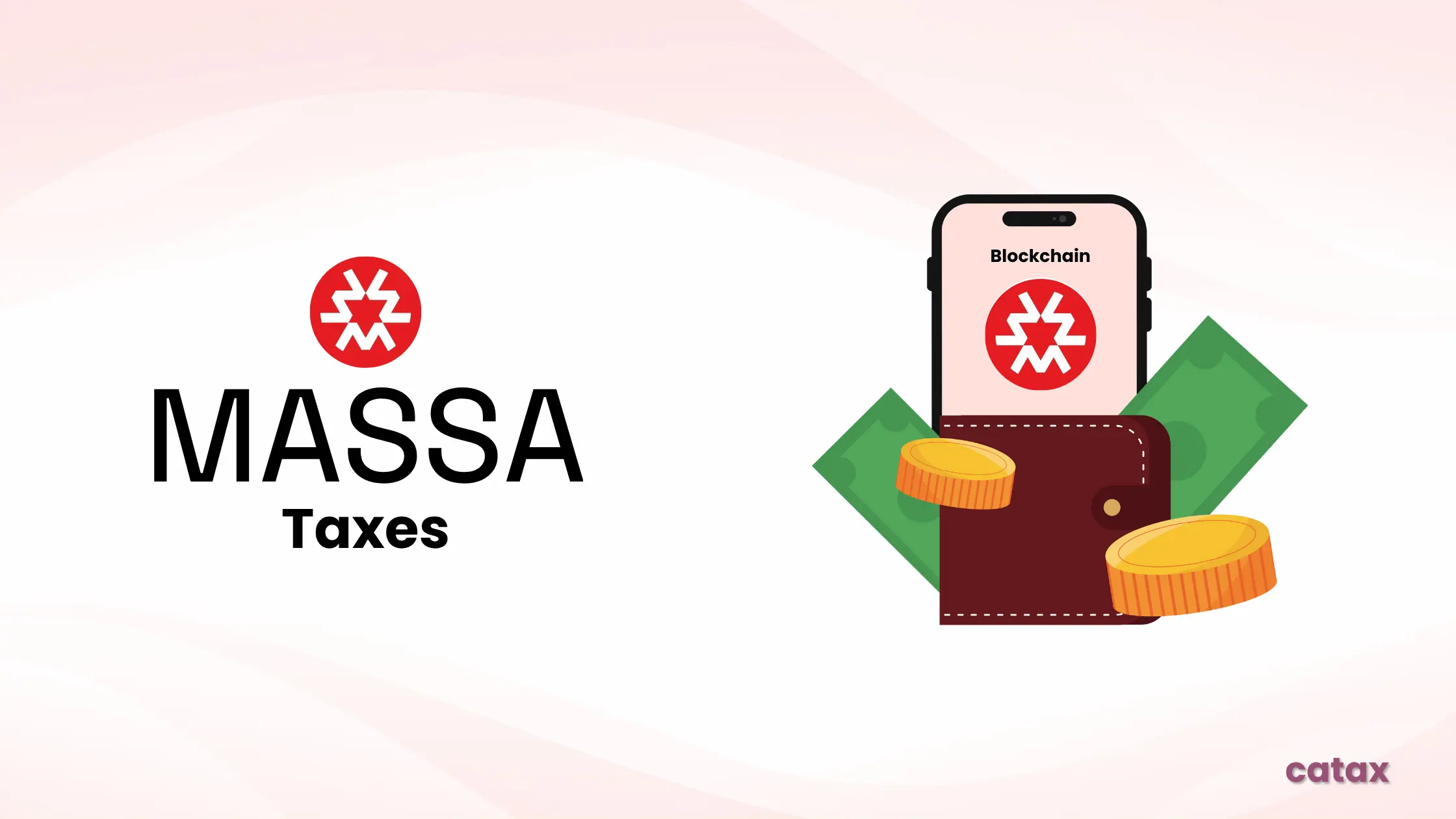Cryptocurrency tax laws differ worldwide and Massa (MAS) is no different. If you are buying, selling, trading, or staking Massa, you may be liable to pay taxes depending on your local laws and uses of your cryptocurrency. Understanding how the tax authorities in your home country view cryptocurrency will allow you to remain compliant and avoid any surprises that may come with tax-related consequences.
This guide will outline everything you need to know regarding how Massa is taxed in straightforward, plain-language terms.

- How to Connect Your Massa Wallet to Catax
- Are Massa (MAS) Transactions Taxable?
- Can You Deduct Trading Fees and Other Costs?
- How Is Massa (MAS) Taxed Based on Holding Time?
- How Is Staking Income from Massa Taxed?
- Can You Use Massa Losses to Lower Your Taxes?
- How to Stay Compliant with Massa (MAS) Tax Regulations?
How to Connect Your Massa Wallet to Catax
You can connect your wallet to Catax in order to accurately track your Massa transactions and set your taxes. It is a simple process, and all your activity will be recorded automatically:
- Open your Massa wallet or block explorer (such as MetaMask, Trust Wallet, Ledger, etc.).
- Locate your public wallet address and copy it.
On Catax:
- Log in to Catax and select your country.
- Choose Chain and then search for Massa Wallet.
- Paste your public address and click Connect.
Catax will now sync your transactions automatically and help you calculate your tax obligations in real-time.
Calculate My Taxes ➤Are Massa (MAS) Transactions Taxable?
Yes, most countries treat cryptocurrency transactions as taxable. How Massa transactions are taxed depends on how you use MAS:
- Selling MAS at a profit: Selling MAS at a profit triggers a capital gains tax. Specifically, if you sell Massa for more than what you originally paid, the difference is considered a taxable capital gain.
- Swapping MAS for other crypto: Swapping MAS for another cryptocurrency is a taxable event, even if you never convert it to fiat. In other words, every time you trade MAS for another crypto, you’re potentially creating a tax liability, whether you profit or not.
- Paying for goods or service with MAS: If the value of Massa has increased since you bought it, using it to pay for something might result in capital gains tax.
- Earning MAS from staking: Many countries treat staking rewards as taxable income at the moment you receive them.
- Getting paid in MAS: If someone pays you in Massa for a product or service, that is generally considered income based on the value of MAS at the time of the transaction.
Because crypto tax rules vary from one country to another, it’s best to check with local regulations or use a tool like Catax that applies the right rules based on your location.
Can You Deduct Trading Fees and Other Costs?
This is a frequent query from Massa users. The answer will depend upon the laws governing the tax rules in your country. Some countries allow for deducting certain expenses incurred for your crypto transactions, such as:
- Exchange fees charged when acquiring, or selling, your MAS.
- Network fees incurred for transferring MAS from one wallet to another.
- Costs incurred for securing your crypto like hardware wallets, or services to help secure your private keys.
However, not all countries provide the ability to deduct all of these expenses. In some places, it may be only the price you purchased (cost basis) and all additional fees plus other expenses are disallowed as deductible expenses. Best to check your local rules and receipts, or talk to a tax professional!.
You can also check out our Country-Specific Guide for Crypto in Your country. This guide provides insights on regulations, tax implications, and compliance measures breifly explained for each country.
How Is Massa (MAS) Taxed Based on Holding Time?
The amount of tax you pay on profits from Massa can vary based on how long you held the tokens:
- Short-term holdings: If you sell MAS within a year of buying it, you might have to pay higher tax rates similar to income tax rates.
- Long-term holdings: If you hold your MAS for more than a year, many countries offer reduced tax rates on long-term capital gains.
- Flat rate countries: Some countries apply the same tax rate no matter how long you hold your crypto.
Understanding your country’s approach to crypto holding periods can help you decide when to sell to minimize taxes.
How Is Staking Income from Massa Taxed?
Staking Massa can earn you rewards, but those rewards are usually taxed in some way. There are generally two ways countries treat staking income:
- Taxed as income: Some countries tax staking rewards as soon as you receive them. This means you need to report them as part of your annual income.
- Taxed as capital gains: Other countries wait until you sell or exchange your staking rewards. At that point, any profit is taxed.
It’s important to know how your country handles staking so you can report it correctly. If staking rewards are taxed as income, you may owe taxes even if you haven’t sold those rewards yet.
Can You Use Massa Losses to Lower Your Taxes?
Yes, in many jurisdictions, if you sell MAS (Masa) for less than you paid for it, you can use that capital loss to reduce your tax liability. Here is a breakdown of how losses usually work:
- Offsetting gains: You might be able to use your losses in Massa to cancel out some gains in other crypto, or even stocks.
- Carrying forward losses: In the absence of any gains in the same year, some jurisdictions allow losses to be carried forward to reduce future taxes.
- No deductions: A couple of jurisdictions might not provide any sort of deductions due to crypto losses, so you’ll want to look up the local rules.
Be sure to keep records of all your transactions so that you can prove your losses if needed.
How to Stay Compliant with Massa (MAS) Tax Regulations?
As governments crack down on crypto taxes and become stricter I think it’s best to try to follow the rules and keep current. Here are three helpful links to stay compliant:
- Learn how your country taxes Massa: Will it be treated as income, as a capital gain, or business income?
- Understand what costs you can deduct: Are trading fees, staking rewards, and security workable cost deductions?
- Keep accurate records: Record every Massa transaction for trading, selling, trading, staking, and spending.
- Use a crypto tax calculator: A platform like Catax can assist you in calculating and filing taxes correctly.
- Talk to a tax professional: If you are unsure of anything it is very wise to consult a tax advisor that knows the crypto laws in your country.


